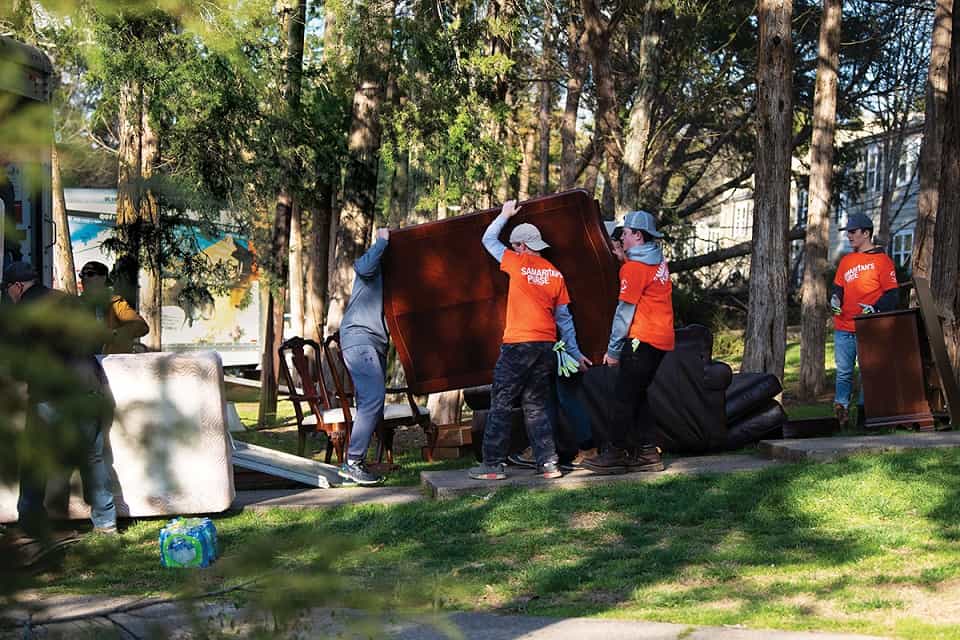
Caregiving is no easy task. For 30 years, I cared for my wife, Katrina, who battled multiple sclerosis. She passed away last year; in retrospect, that experience has helped me better understand our responsibility to the world. As the Bride of Christ, we are caregivers to the world. For 2,000 years, the church has ministered to others, even during times of mass pandemics and global emergencies.
Subscribe to Decision
Get your own subscription, or renewal, or bless someone by giving Decision Magazine as a gift.
SUBSCRIBE NOW
It started with Jesus, who healed the sick, touched the lepers, cheered the sorrowing, fed the hungry, taught the masses, reformed the hearts and taught us to give a cup of cold water to the thirsty—all the while preaching the Gospel and offering everlasting life through His own shed blood.
The early church maintained the same Jesus-like balance between physical and spiritual caregiving. In Acts 9, for example, the newly converted Saul of Tarsus “preached fearlessly in the name of Jesus” in Jerusalem (verse 27), while over in Joppa, a woman named Dorcus “was always doing good and helping the poor” (verse 36).
James 1:27 became the watchword for the early Christians: “Religion that God our Father accepts as pure and faultless is this: to look after orphans and widows in their distress and to keep oneself from being polluted by the world.”
In Roman times, it was the church that virtually invented hospitals. The Romans idolized healthy bodies but disdained the weak. Medical services were primarily for soldiers and gladiators. Saint Basil of Caesarea used his own fortune to found a hospital in the Name of Christ for the sick of his city, and soon hospitals sprang up throughout the Christianized world.
When the Antonine Plague swept every corner of the Roman Empire in the second century, Christians were the ones who cared for the sick and buried the dead. As a result, thousands of people turned to Christ for salvation as the plague ended.
Throughout the Middle Ages, Christians encouraged education, cared for the sick and took care of orphans and widows. In his foreword to Alvin Schmidt’s book “How Christianity Changed the World,” Paul Maier wrote: “In the ancient world, [Christ’s] teachings elevated brutish standards of morality, halted infanticide, enhanced human life, emancipated women, abolished slavery, inspired charities and relief organizations, created hospitals, established orphanages and founded schools.”
He continued, “It was Christians who invented colleges and universities, dignified labor as a divine vocation and extended the light of civilization to barbarians on the frontiers. … No other religion, philosophy, teaching, nation, movement—whatever—has so changed the world for the better as Christianity has done.”
When the bubonic plague brought terror to central Europe in 1527, local officials ordered Martin Luther to flee Wittenberg. Luther and his pregnant wife, Katharina, refused. Instead, they turned their home into a medical ward for the sick. Luther wrote, “No one should dare leave his neighbor unless there are others who will take care of the sick in their stead and nurse them … We are bound to each other in which no one may forsake the other in his distress but is obligated to assist and help him as he himself would like to be helped.”
In the 1790s in England, William Wilberforce was battling another plague—the brutality of slavery in the British Empire. Based on his Biblical faith, Wilberforce defied public hostility and political enmity as he fought for the freedom of oppressed millions.
It is not an exaggeration to say that the greatest society-changers and humanitarians the world has ever known have been—and are—the followers of Jesus Christ.
Recently a series of tornadoes ripped through my city of Nashville, damaging hundreds of houses, my daughter’s among them. Like Revolutionary minutemen, a large team of workers pulled into the middle of our community and went to work. It was Samaritan’s Purse, and we couldn’t believe what they did
Victoria told me, “I was so paralyzed, I couldn’t tell them what to do, but they already knew. They organized the volunteers, cut fallen trees from off the house, dismantled the crushed garage, put our exposed keepsakes under tarps, cleaned and bleached the refrigerator, hauled debris to the curb, raked the lawn for dangerous objects, swept the driveway—not just at our house but at every house up and down the street. On the last day, they gathered everyone together, prayed in a circle and presented each family with a Bible signed with all their names.”
In 2 Kings 2:19-22, the Prophet Elisha came into the town of Jericho and found the water in the local well poisonous. He threw a bowl of salt into the waters and healed them. You and I—the followers of Christ—are the salt of the earth. Our Savior has thrown us into this poisoned world to help and to heal. Somewhere near you, you have a neighbor to love, a heart to cheer, a task to do and a cool drink to hand to the thirsty in Jesus’ Name.
Think of yourself as a grain of salt in our Lord’s bowl—and look around to find someone today who needs the care of Christ. ©2020 Robert J. Morgan
Scripture quotations are taken from The Holy Bible, New International Version.
Robert J. Morgan is the teaching pastor of The Donelson Fellowship, in Nashville, Tennessee, and the author of more than 35 books.
Photo: David Morrison/©2020 Samaritan’s Purse
Give To Where Most Needed
